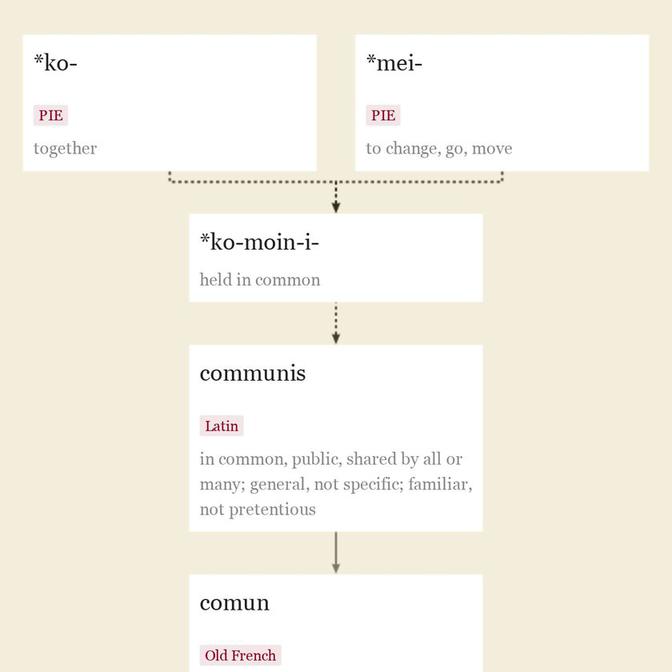uncommon (adj.)
1540年代,“不共有的”,来自 un-(1)“不”+ common(adj.)。意思是“不常见的,不寻常的,罕见的”,记录于1610年代。相关词: Uncommonly。
uncommon 的相关词汇

公元1300年左右,“belonging to all, owned or used jointly, general, of a public nature or character”一词源自古法语 comun “common, general, free, open, public”(9世纪,现代法语 commun),源自拉丁语 communis “in common, public, shared by all or many; general, not specific; familiar, not pretentious.” 这是从重建的原始印欧语 *ko-moin-i- “held in common”中得出的,这是一个由 *ko- “together”和 *mei-(1)的词根的后缀形式 *moi-n-, 组成的复合形容词,因此字面意思是“shared by all”。
该复合词的第二个元素也是拉丁语 munia “duties, public duties, functions”的来源,这些职责与 munia “office”有关。也许在古法语中受到了原始印欧语 *ko-moin-i- 的日耳曼形式的加强(比较德语 gemein,古英语 gemne “common, public, general, universal”; 参见 mean(adj.)),这些形式通过法兰克语传入了法语。
自公元1300年以来,该词被用来贬低妇女和罪犯。意思是“pertaining equally to or proceeding equally from two or more”源自公元1400年左右。意思是“usual, not exceptional, of frequent occurrence”源自14世纪晚期。意思是“not distinguished, belonging to the general mass”源自公元1400年左右; 对于事物来说,“ordinary, not excellent”源自14世纪晚期。
Common pleas 是13世纪的,来自盎格鲁-法国语 communs plets,指一个主体对另一个主体提起的民事诉讼,与王室诉讼相对。 Common prayer 是与其他敬拜者一起公开进行的祈祷,与私人祈祷相对。 Common stock 出现于1888年。 Common speech(14世纪晚期)是指白话,与拉丁语相对。 Common good(14世纪晚期)翻译自拉丁语 bonum publicum “the common weal.” 学院的 common room(1660年代)是所有成员都可以共同使用的房间。
否定前缀,古英语 un-,源自原始日耳曼语 *un-(也源自古撒克逊语、古弗里西亚语、古高地德语、德语 un- 、哥特语 un- 、荷兰语 on-),源自 PIE *n-(源自梵语 a- 、an- “不”,希腊语 a- 、an-,古爱尔兰语 an-,拉丁语 in-),是 PIE 词根 *ne- “不”的组合形式。通常委婉(例如 untruth 代表“谎言”)。
最常用的英语前缀,自由广泛地用于古英语中,形成了1000多个化合物。它在中古英语早期经历了大规模灭绝,但在16世纪重新兴起,与本土和进口词汇形成化合物。它与拉丁语衍生的同源词 in-(1)争夺形成某些词的否定的权利(indigestable/undigestable 等),虽然两者可能合作使用以表示意义的不同程度(unfamous/infamous),但通常不这样做。
它还可以从短语中制造单词(例如 uncalled-for,约1600年; undreamed-of,1630年代; uncome-at-able,1690年代; unputdownable,1947年,用于书籍; un-in-one-breath-utterable,本·琼森等,但这种习惯不仅限于 un-; 例如 put-up-able-with,1812年)。作为电报语中的前缀,替换 not 并节省一个单词的成本,最早可追溯到1936年。